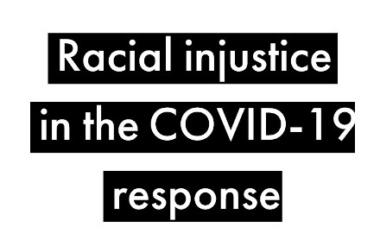The charity sector will be unable to respond effectively to the coronavirus crisis unless it also addresses its own inequalities and finds urgent funding for Black, Asian and Minority Ethnic (BAME) charities on the frontline, CharitySoWhite says.
CharitySoWhite, a group of volunteers that is campaigning for racial equality in the sector, has today published a paper, Racial Injustice in the Covid-19 Response. It calls for urgent funding and other support for BAME charities that are at risk of closure.
It says that the Covid-19 pandemic will disproportionately affect BAME communities and says that if charities do not put racial justice at the heart of their response then it will be ineffective.
However, CharitySoWhite say that some charities have already indicated that racial justice work has been sidelined because of the crisis.
In an article for Civil Society Voices, they say: “We are saddened to have heard ourselves, and from allies, that some charities are planning to put work towards racial justice on the backseat for the time-being, as it is not felt to be a priority. The response to this unprecedented crisis should not be about choosing between tackling racial injustice vs. mitigating the impact of the coronavirus.”
Five principles for charity leaders
CharitySoWhite highlights five principles that should guide the sector’s response to the crisis:
- Address racial inequalities in the sector. It says: “Any response we deliver will only be effective if we take an intersectional approach accounting for racial injustices in our society.”
- Acknowledge who holds power. It says: “We hold more power as a sector than we admit. It’s time to use it and to recognise that current models of funding and delivery are struggling while others which don’t meet our standard metrics are taking the lead.
- Value lived experience. It says: “Account for the different lived experiences of marginalised communities and prioritise coordinated action to centre them in delivery and funding.”
- Trust the BAME voluntary sector. It says: “To best reach those most impacted by the crisis we need to work with organisations working closest to them. We urge organisations to avoid knee-jerk relief efforts and ensure they have built in the mechanisms to work directly with community leaders.”
- Recognise and support BAME staff and volunteers. It says: “Recognise that BAME employees will be disproportionately impacted by the pandemic and to account for the fact that many workers in the sector will be at risk of staff cuts and hiring freezes because they tend to be more junior or on temporary contracts.”
BAME VCS has been decimated
The paper says that the BAME voluntary and community sector urgently needs more funding.
It reports that there are between 9,000 -10,000 BAME charities and community groups operating nationally, 65% of which have an average turnover of less than £10,000 annually.
But it says that: “Over the last decade we have seen the decimation of the BAME voluntary sector. Most existing BAME-led organisations are small, community-based charities working directly with those with the greatest needs.
“They have limited resources to showcase their value to funders or tick the boxes needed. These same groups are seeing rising demand for their services. Many are on the brink of closure, lacking reserves due to years of under-funding. This would leave many communities without essential and trusted specialist support and infrastructure.”
The paper calls on funders and large charities to consider how they could help.
It says: “BAME VCS groups need an urgent and adequate injection of funds to ensure their continued existence, but will not be able to compete unless larger charities cede their ground, and funders actively seek their inclusion.”
Related articles












